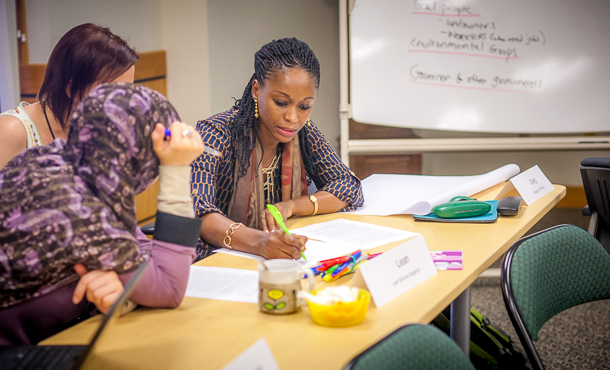The Summer Peacebuilding Institute at Eastern Mennonite University, which has emerged since 1994 as a global leader in the training of peacebuilders and social justice advocates, returns next summer for its 22nd season with several programmatic changes.
Five- and seven-day classes, hybrid online learning options, training tracks on specific interest areas, and opportunities to attend conferences or consultations are a few of the major changes outlined by institute director Bill Goldberg.
“The actual experience of SPI will remain very familiar for faculty and students,” said Goldberg, “but the revamped program highlights SPI’s strengths and builds intentionally upon our core values of community learning, interactive learning experiences, and cross-pollination of ideas and insights around issues of justice and peacebuilding.”
From its origins with 40 participants in the first official event held by what is now known as the Center for Justice and Peacebuilding, or CJP, the Summer Peacebuilding Institute has brought 2,900 people from 123 countries to EMU’s campus. It’s also been the inspiration behind 12 other peacebuilding institutes around the world, recently featured in a special double issue of CJP’s Peacebuilder magazine.
But changes in practice and theory of international and domestic peace and justice work mean continually evaluating the program’s goals, vision and quality, said Jayne Docherty, CJP program director. “We’re constantly working to keep CJP and SPI at the forefront of these fields.”
The most overt structural change is to the length of offerings. Instead of 7-day courses that began or ended in the middle of the week, next summer’s SPI schedule includes two 7-day sessions (May 9-17 and May 19-27) and two 5-day sessions (May 30-June 3 and June 6-10).
While participants can attend just one course, there are opportunities to attend two or more sessions on a specific track, with the potential for gaining more skills and knowledge than a single course offers, Goldberg said. Tracks this year include trauma awareness and resilience, restorative justice, community action and organizing, the peacebuilding arts, and executive leadership for organizations focused on social change.
The fourth session highlights skills-based courses, such as narrative practices, playback theater, photography for community empowerment, and blended arts and bodywork for resilience.
All courses are offered for training or for academic credit. All 5-day courses can be taken for 2 credits, and some of the 5-day courses offer a 3-credit hybrid option, in which students benefit from online interaction and group engagement after leaving campus.
Participants always leave SPI with a broader network of contacts of those engaged in similar kinds of peacebuilding and social justice work around the world, Docherty said. “We want to carefully nurture and continually support this very valuable source of learning and support, and the online learning community is one way of doing that.”
The new structure also includes a week for a larger community collaboration, such as a conference or consultation. In 2016, SPI will host a restorative justice conference, building upon last summer’s consultation hosted by the Zehr Institute for Restorative Justice.
Organizations who are interested in bringing a specific topic or focus to this conference space in future years are encouraged to contact SPI as soon as possible to reserve facilities for the 2017 institute.
